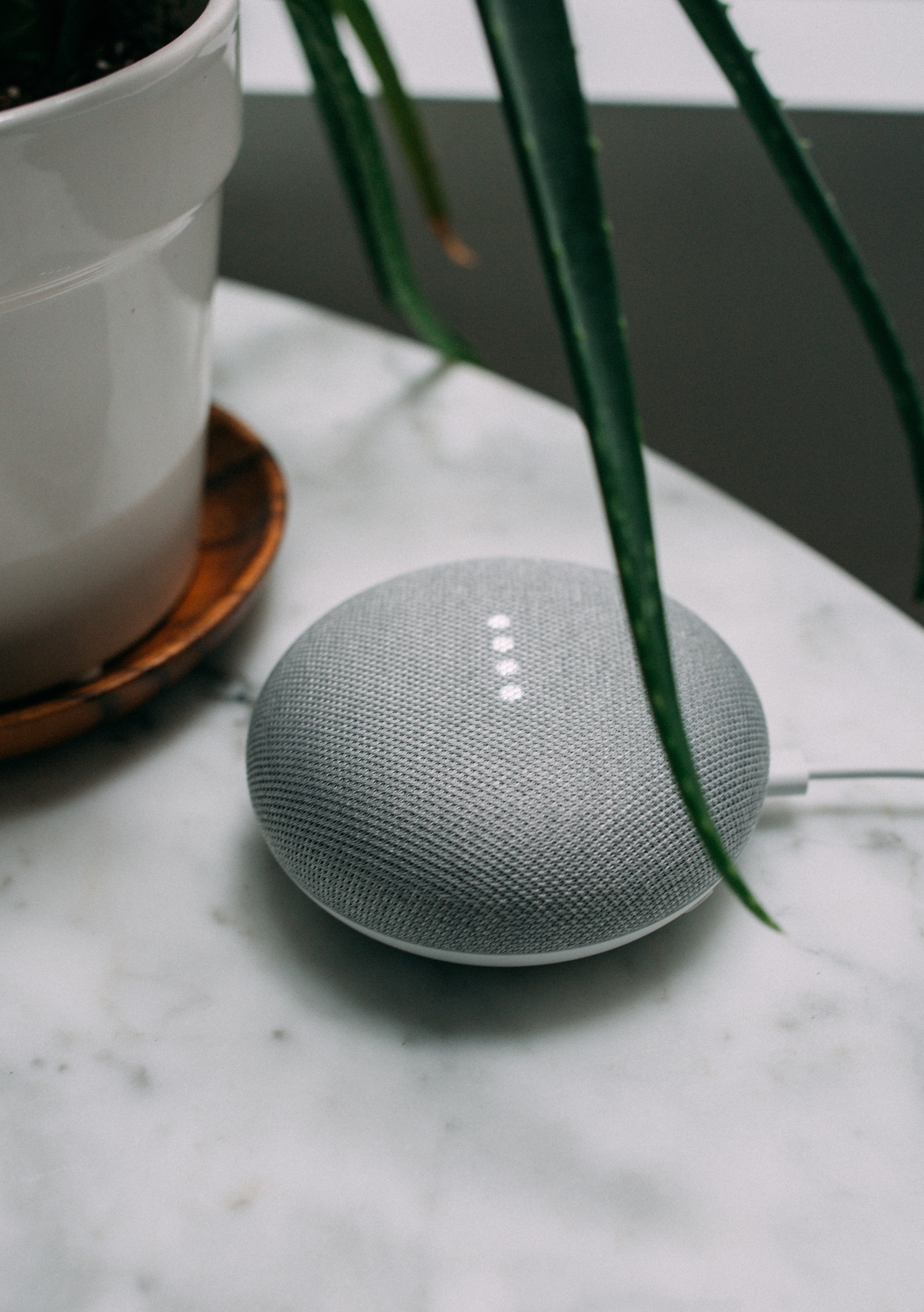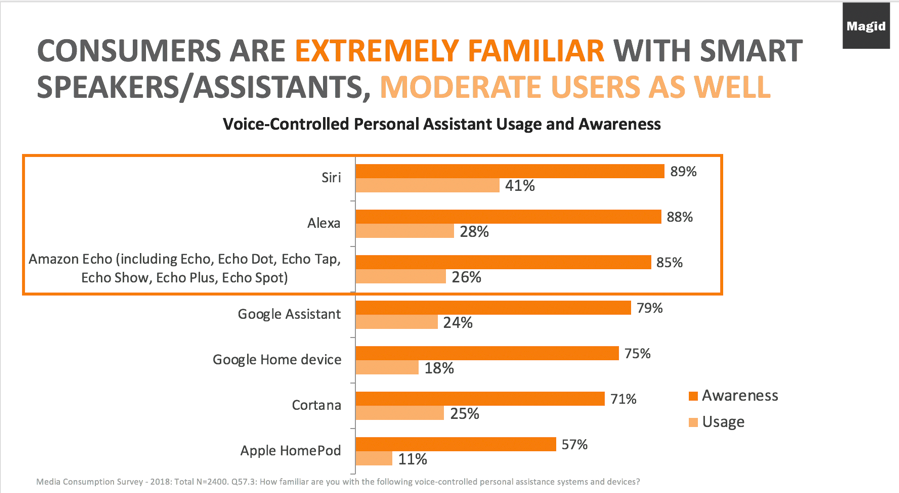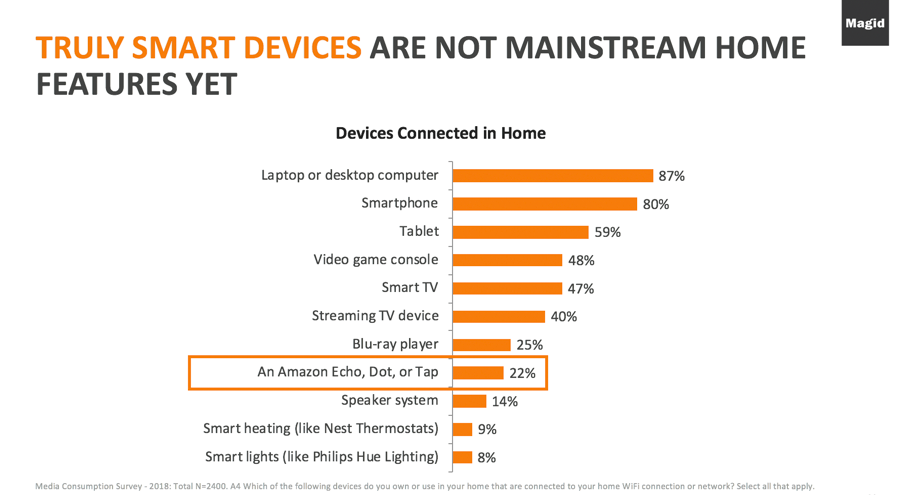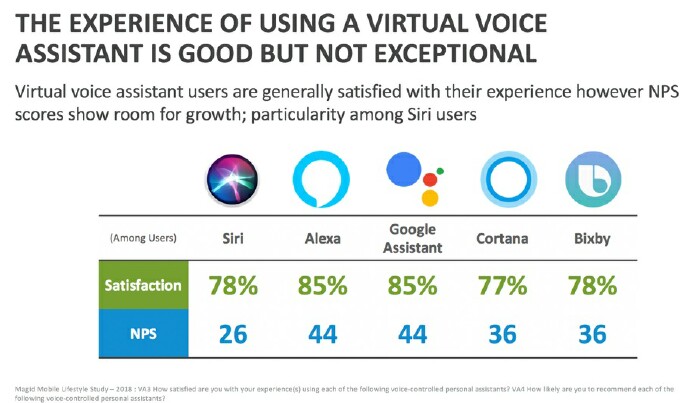Smart Speakers: AI's Soft Leading Edge

Don't worry, this is not a tech article. I am not going to explain AI and what it will take to pass the Turing Test. We're going to keep this simple. But I do want you to think of digital assistants, voice search and smart speakers/devices as the consumer-facing soft leading edge of artificial intelligence.
It's not so scary (just a little frustrating right now) asking Alexa to play Nightmares on Wax. Or asking, "Hey Google, who played Starbuck on Battlestar Galactica?" Or asking Siri to lower the temperature to 72°. It's non-threatening, kind of fun and getting better all the time. We will slowly incorporate this convenience into our lives and before long we will wonder how we lived without it.
In case you haven't noticed, there is an AI arms race going on. The big players are Amazon with Alexa, Google with Google Assistant, Apple with Siri, Microsoft with Cortana and Samsung with Bixby. Over eight of every 10 U.S. consumers are aware of them, and usage is on the rise.

Whether voice assistants are simply resident on your smartphone or embodied in your home on a smart speaker capable of interacting with other smart devices, the fact that the primary interface of interaction is your voice is significant. Voice is a great interface -- from the human side it's low friction, intuitive and easy to use. As the AI side gets better at speech recognition and natural language processing -- understanding context, intent and nuance -- it will be the easiest way to interact in the digital world. There are projections that by 2020 half of all searches will be conducted by voice rather than typing (comScore). Magid's own Mobile Lifestyle research found that 54% of mobile users in the U.S. use a voice assistant at least once a week, and 32% use it once a day or multiple times a day.
Let's focus on the smart speakers for a moment -- the closest thing we have right now that resembles what AI will emerge to be in the home setting of the future. With all the changes taking place in media and entertainment due to changing behaviors like bingeing, streaming and cord cutting, you may be wondering why you should care. After all, smart speakers are relatively nascent right now.
Magid's latest Media Consumption Study shows only 22% of homes have connected an Amazon Alexa device (Echo, Dot or Tap) to their home's Wi-Fi connection. Current satisfaction with the devices is solid but not stellar.

"Hey Alexa – Find Me Something Good to Watch"
Why should you care and why should you care now? Because voice assistants/smart speakers -- AI -- will be the next great disintermediator between you and your customers.
Major media companies are investing billions in SVOD platforms and services that enable a direct relationship with the customer. Finally, no distributors in the middle keeping them from direct access to the end user. Finally, the ability to have a one-to-one personalized relationship with the viewer. Finally, access to valuable viewing data.
Enter voice-activated AI -- the new gatekeeper. A new walled garden. A new search paradigm to master at best, and a new pay-to-play disintermediator at worst.
Voice Assistants and Smart Speakers: The Next Great Disintermediator Between You and Your Customers
The news industry is slowly waking up to the impact of AI, and so should the entertainment industry. A year ago, Trushar Barot, an editor at the British Broadcasting Corporation, in an article for Harvard's NiemanLab wrote, "AI is largely being missed as an industry priority … it feels like we're the frog being slowly boiled alive, not perceiving the danger to itself until it's too late to jump out." He continued by relaying something he said to futurist and author Amy Webb: "In all the speeches and presentations I've made, I've been shouting about voice AI until I'm blue in the face. I don't know to what extent any of the leaders in the news industry are listening."
Barot adds to this with a quote Webb wrote in a piece for Nieman Reports: "Talking to machines, rather than typing on them, isn't some temporary gimmick. Humans talking to machines -- and eventually machines talking to each other -- represents the next major shift in our news information ecosystem."
The same holds true for entertainment.
Now that I have your attention, here's your AI/Smart Speaker to-do list:
- Learn. Be proactive in understanding the impacts of voice-enabled AI in the home.
- Skills. Become active with the major players and help develop skills for your brands. This will help you understand the potential gatekeepers now.
- Develop an Agile Strategy Template (AST) for AI. Start scenario planning for short-term and long-term impacts.
- Don't wait.
Photo credit: Charles Deluvio/Unsplash
Click the social buttons above or below to share this story with your friends and colleagues.
The opinions and points of view expressed in this content are exclusively the views of the author and/or subject(s) and do not necessarily represent the views of MediaVillage.com/MyersBizNet, Inc. management or associated writers.


